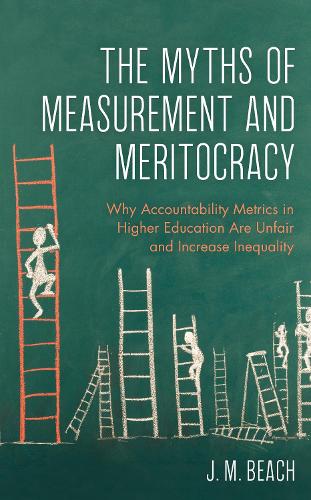
The Myths of Measurement and Meritocracy: Why Accountability Metrics in Higher Education Are Unfair and Increase Inequality
(Paperback)
Publishing Details
The Myths of Measurement and Meritocracy: Why Accountability Metrics in Higher Education Are Unfair and Increase Inequality
By (Author) J. M. Beach
Foreword by David Labaree
Bloomsbury Publishing PLC
Rowman & Littlefield Publishers
15th September 2021
United States
Classifications
Professional and Scholarly
Non Fiction
Educational strategies and policy
Decision theory: general
379.158
Physical Properties
Paperback
210
Width 154mm, Height 230mm, Spine 17mm
322g
Description
This book examines the idea of educational accountability in higher education, which has become a new secular gospel. But do accountability policies actually make colleges better What if educational accountability tools dont actually measure what theyre supposed to What if accountability data isnt valid, or worse, what if its meaningless What if administrators dont know how to use accountability tools or correctly analyze the problematic data these tools produce What if we cant measure, let alone accurately assess, what matters most with teaching or student learning. What if students dont learn much in college What if higher education was never designed to produce student learning What if college doesnt help most students, either personally or economically What if higher education isnt meritocratic, actually exacerbates inequality, and makes the lives of disadvantaged students even worse This book will answer these questions with a wide, interdisciplinary range of the latest scientific research.
Reviews
This book is a companion volume to Beach's previously published Can We Measure What Matters Most (2021). The two volumes challenge those who support the academic accountability movement's use of quantitative measures to assess teaching and learning. This volume focuses on consumer surveys, which Beach, an expert on teaching and learning, contends reflect popularity more than effectiveness in teaching and learning and are more likely to favor those who want to "play school" with students more interested in credentials than learning. Recommended. Graduate students and faculty. * Choice Reviews *
Beach argues that the accountability movement, which has already done so much damage to American public schools, is now coming after higher education as well, and he shows that this effort is not only based on faulty measures but also promises to lay waste to a system that is the envy of the world. -- David F. Labaree, Professor Emeritus, Graduate School of Education, Stanford University. He is author of How to Succeed in School Without Really Learning, Someone Has to Fail, and A Perfect Mess
Playing school is endemic throughout K-12 and higher education. Evaluation--both of students and of educators--is how we score the game. In this scholarly exploration of the sociology, economics, philosophy, and history of contemporary education, Josh Beach explores how and why the scoring rules became bogus and antithetical to supporting learning and improving teaching, rewarding behavior that undermines learning. The current quagmire arose from the postwar push for scientific management--and viewing education as a consumer product--enabled by questionable measurement practices, irrational reverence for numbers, and a generous helping of the equivocation fallacy (e.g., conflating students' response to the prompt, how effective was the instructor with actual teaching effectiveness). I recommend this book to anyone who relies on, is subjected to, or engages in the evaluation of teaching and learning. -- Philip B. Stark, Associate Dean for the Division of Mathematical and Physical Sciences and Professor of Statistics, University of California at Berkeley
Author Bio
J. M. Beach is the founder and director of 21st Century Literacy, a non-profit organization focused on literacy education and teacher training. He was a lecturer in higher education for over 20 years in the U.S., South Korea, and China.
